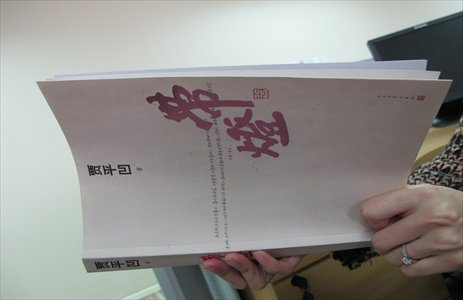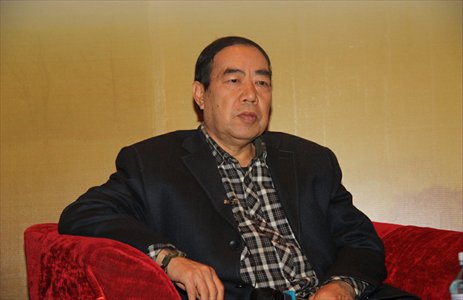Harsh light of fireflies


Rural reality as viewed by judicious female official
The firefly, an insect that gives off a florescent yellow-green light at night, has become a hero in Jia Pingwa's new book, though figuratively. Jia, one of the most influential writers in China, has brought another voluminous work to readers recently - a 400,000-character novel titled Dai Deng. In the press conference last Thursday, the 2008 Mao Dun Literature Prize winner introduced that the book is named for the heroine in the story who works as a township official.
Like most of his other works, Dai Deng is about life in the rural countryside. But as Jia himself said, it is a novel depicting reality from a much shorter range. Through the character Dai Deng's experiences at the grass-roots levels, Jia paints a complete picture of the Chinese countryside full of problems and crises hidden under a peaceful surface.
Bringing light, getting burned
Dai Deng was originally named Ying, which means firefly, but she takes offense from the allusion to the insect commonly thought to spring from rotten grass. So she changes her name to Dai Deng, literally meaning "bringing light," because she believes the firefly could be regarded as the bringer of light itself.
Yingzhen town, where Dai lives, is a town of complaints and restlessness. The book starts with a mass disturbance in Yingzhen in which hundreds of farmers block bulldozers and excavators from digging a tunnel through a nearby mountain. Then Jia shifts to Dai's own experience in this town. As head of the township comprehensive administration office, she is mainly in charge of dealing with local disputes and petitions. Every day, Dai has to unravel the entanglements in the villages, from trivial things such as fighting for a tree to violent events and corruption.
But Dai is not a tough and forceful woman as many would imagine. Quite the opposite, she is a gentle and kind woman with interests in literature and living an idyllic life. Unlike her colleagues who try all means to get promoted, she tries to maintain her true personality and conscience within her unhealthy environment.
As Jia wrote, "Dai feels unaccustomed to the people in the township government, and the latter feel unaccustomed to Dai. The job of the government is like driving a carriage, which is shabby and old but carries a lot of things. It falters and cries and seems to stop ... but it is still going forward. Dai is tied to the carriage."
She tries her best to help the villagers, but meanwhile she has to maintain stability. The first thing she learns about her job is to "accept what she cannot change." Conflicted and helpless, she turns to her idol, a provincial official from Yingzhen, for spiritual comfort.
Ultimately, she fails to get through - almost suffering from schizophrenia due to the huge gap between the life she yearns for and harsh reality. It is a story of sacrificing herself for her ideals, a tragedy of the times into which she cannot fit or get out of.
In spite of that, Jia stakes his ideals on Dai. Near the end, a swarm of fireflies gather around Dai's body to illuminate her. "The firefly brings a lamp of weak light in the dark and tries its best to burn and lighten. If everyone is like a firefly, the little light could accumulate and help brighten things for a lot of people," Jia said.
Not hearsay, painful truth
The model for Dai's character is a real-life female grass-roots official who is a fan of Jia's writing. She contacts Jia frequently and communicates with the author about her life and daily job. From her, Jia was able to get first-hand material. He also visited villages and towns and talked to petitioners to have a look for himself at the problems.
Dai Deng says in the novel that rural China "is like old cobwebs that fall into dust when you touch them." Dai Deng the novel is the hand that has shaken the web and reveals numerous problems in rural areas that involve morality, law, faith and the system.
"I saw many crises and problems there that made me feel upset and have the impulse to write," Jia said, "They deserve attention." He added that he wanted to go into the depth of life. "The material I used must be real and from real life, not just hearsay."
Pan Kaixiong, a literary critic, said Dai Deng faces China's social reality most directly this time.
Kong Lingyan, editor of the book, agreed. "His previous novels usually talk about real society in a roundabout way by adding other elements," Kong told Global Times, "This one is sheer reality without any veil."
As reform and opening-up push forward, various kinds of problems and disputes emerge at the basic level amid rapid economic development. Jia said that problems are inevitable in a society in transition and provides opportunities for literary creation.
Besides Shaanxi, he has traveled to other provinces such as Henan and Gansu to know more about rural areas and basic-level governments: Dai Deng combines what he saw. Jia said that although his story is only about one township official, he was thinking about the country as a whole. "I've no prescription, but I can write what I saw and show my concern."
Li Xing, one judge for the Maodun Literature Prize, regarded Dai Deng as a "painful" work that reflects Jia's unprecedented sharpness for social reality and deep concern for the disadvantaged groups in the rural areas.
Old writer, new elements
It took Jia almost three years to finish Dai Deng, which he regarded a gift for his 60th birthday. His talent as a writer continues to win fans who are often surprised to learn that he persists in writing by hand. Meanwhile, those familiar with his work will be surprised by several breakthroughs in this new work.
As many will notice, Dai Deng is the first female protagonist in a Jia Pingwa novel. Kong said it is a highlight of the novel.
Jia revealed that the change is mainly because he knows such a person in reality, and women have a natural advantage at dealing with complicated grass-roots problems using sympathy, wisdom and flexibility.
In the novel, Dai's feminine nature and upper-middleclass mentality is in sharp contrast with her daily job. "Men writing about women are likenandanplaying female roles in Peking Opera," said Jia, "sometimes they can deliver a more vivid figure."
While many readers find Jia's previous novels such as Ancient Furnace and Qin Qiang hard to read, he tried new narration modes in the new book. Dai Deng boasts a more lucid and straightforward way of telling stories.
Jia said that age has changed him. "I've become interested in the narration style of Western Han (206BC-25AD), which is concise, direct, blunt and penetrating, without being circumbendibus."
Before its publication, Dai Deng was serialized in the magazine Harvest since last November. Some questioned whether the story showed too much of the negative side. Jia said that some think he is criticizing reality while others say he is praising people like Dai Deng.
"I didn't think much about it. I just used Dai's job to reflect the whole grassroots society," he said, "that's a writer's duty, to express feelings about society sincerely and represent problems, to arouse attention," a duty he told Global Times he will continue to fulfill in the future.